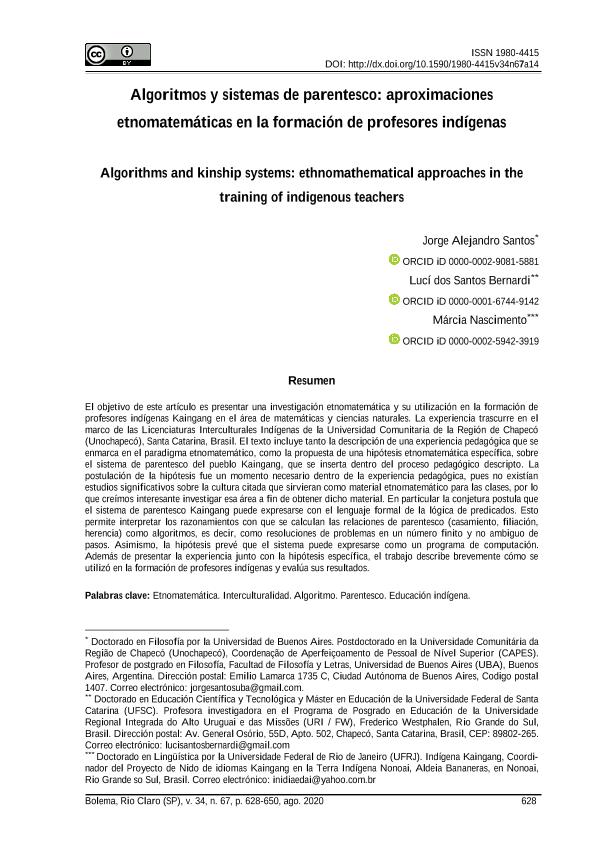Mostrar el registro sencillo del ítem
dc.contributor.author
Santos, Jorge Alejandro

dc.contributor.author
Bernardi, Lucí dos Santos
dc.contributor.author
Nascimento, Márcia
dc.date.available
2022-06-29T17:11:52Z
dc.date.issued
2020-08
dc.identifier.citation
Santos, Jorge Alejandro; Bernardi, Lucí dos Santos; Nascimento, Márcia; Algoritmos y sistemas de parentesco: aproximaciones etnomatemáticas en la formación de profesores indígenas; Universidade Estadual Paulista; Bolema; 34; 67; 8-2020; 628-650
dc.identifier.issn
0103-636X
dc.identifier.uri
http://hdl.handle.net/11336/160786
dc.description.abstract
El objetivo de este artículo es presentar una investigación etnomatemática y su utilización en la formación de profesores indígenas Kaingang en el área de matemáticas y ciencias naturales. La experiencia trascurre en el marco de las Licenciaturas Interculturales Indígenas de la Universidad Comunitaria de la Región de Chapecó (Unochapecó), Santa Catarina, Brasil. El texto incluye tanto la descripción de una experiencia pedagógica que se enmarca en el paradigma etnomatemático, como la propuesta de una hipótesis etnomatemática específica, sobre el sistema de parentesco del pueblo Kaingang, que se inserta dentro del proceso pedagógico descripto. La postulación de la hipótesis fue un momento necesario dentro de la experiencia pedagógica, pues no existían estudios significativos sobre la cultura citada que sirvieran como material etnomatemático para las clases, por lo que creímos interesante investigar esa área a fin de obtener dicho material. En particular la conjetura postula que el sistema de parentesco Kaingang puede expresarse con el lenguaje formal de la lógica de predicados. Esto permite interpretar los razonamientos con que se calculan las relaciones de parentesco (casamiento, filiación, herencia) como algoritmos, es decir, como resoluciones de problemas en un número finito y no ambiguo de pasos. Asimismo, la hipótesis prevé que el sistema puede expresarse como un programa de computación. Además de presentar la experiencia junto con la hipótesis específica, el trabajo describe brevemente cómo se utilizó en la formación de profesores indígenas y evalúa sus resultados.
dc.description.abstract
The goal of this paper is to present an ethnomathematical research and its use in the training of Kaingang indigenous teachers in Mathematics and Natural Sciences. The experience takes place within the Indigenous Intercultural Bachelor's degrees of the Community University of the Chapecó Region (Unochapecó), in Santa Catarina, Brazil. The text includes both the description of a pedagogical experience that is framed in the ethnomathematical paradigm, as well as the proposal of a specific ethnomathematical hypothesis, about the Kaingang people's kinship system. The postulation of the hypothesis was a necessary moment within the pedagogical experience, since there were no significant studies on the cited culture that would serve as ethnomathematical material for the classes, so we thought it would be interesting to investigate that area in order to obtain the cited material. The conjecture specifically postulates that the Kaingang kinship system can be expressed in the formal language of a predicate logic. This allows us to interpret the reasoning with which kinship relations (marriage, affiliation, inheritance) are calculated as algorithms, that is, as resolutions of problems in a finite and unambiguous number of steps. The hypothesis also provides that the system can be expressed as a computer program. In addition to presenting the experience together with the specific hypothesis, the work describes how it was used in the training of indigenous teachers and evaluates its results.
dc.format
application/pdf
dc.language.iso
spa
dc.publisher
Universidade Estadual Paulista

dc.rights
info:eu-repo/semantics/openAccess
dc.rights.uri
https://creativecommons.org/licenses/by/2.5/ar/
dc.subject
ETNOMATEMÁTICA
dc.subject
INTERCULTURALIDAD
dc.subject
ALGORITMO
dc.subject
PARENTESCO
dc.subject.classification
Educación General

dc.subject.classification
Ciencias de la Educación

dc.subject.classification
CIENCIAS SOCIALES

dc.title
Algoritmos y sistemas de parentesco: aproximaciones etnomatemáticas en la formación de profesores indígenas
dc.title
Algorithms and kinship systems: ethnomathematical approaches in the training of indigenous teachers
dc.type
info:eu-repo/semantics/article
dc.type
info:ar-repo/semantics/artículo
dc.type
info:eu-repo/semantics/publishedVersion
dc.date.updated
2022-06-24T17:25:16Z
dc.identifier.eissn
1980-4415
dc.journal.volume
34
dc.journal.number
67
dc.journal.pagination
628-650
dc.journal.pais
Brasil

dc.journal.ciudad
São Paulo
dc.description.fil
Fil: Santos, Jorge Alejandro. Consejo Nacional de Investigaciones Científicas y Técnicas; Argentina. Universidad de Buenos Aires. Facultad de Filosofía y Letras; Argentina. Universidad Nacional de Hurlingham. Instituto de Educacion.; Argentina. Universidad Nacional de Lomas de Zamora; Argentina
dc.description.fil
Fil: Bernardi, Lucí dos Santos. Universidade Regional Integrada do Alto Uruguai e das Missões; Brasil
dc.description.fil
Fil: Nascimento, Márcia. Universidade Federal do Rio de Janeiro; Brasil
dc.journal.title
Bolema

dc.relation.alternativeid
info:eu-repo/semantics/altIdentifier/url/http://www.scielo.br/scielo.php?script=sci_arttext&pid=S0103-636X2020000200628&tlng=es
dc.relation.alternativeid
info:eu-repo/semantics/altIdentifier/doi/http://dx.doi.org/10.1590/1980-4415v34n67a14
Archivos asociados
